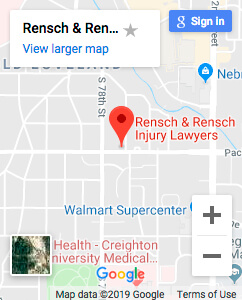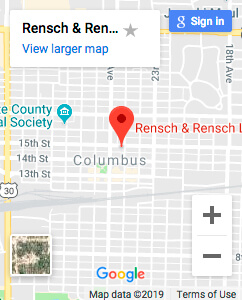Self-Driving Cars—Coming to a City Near You?
Omaha, Nebraska. According to Reuters, the House may vote on self-driving car legislation as early as next week. The legislation would allow car makers to more quickly deploy autonomous vehicles and the law would also bar states from stopping the vehicles from using their roads. As many as 25,000 vehicles would be permitted to operate on roadways without requiring them to meet current safety standards. While the thought of autonomous vehicles hitting the road is exciting for some, others are concerned about the potential safety risk these vehicles could pose to the general public should they be prematurely allowed on the road.
After all, if a person is injured by an autonomous vehicle, who would be responsible for the victims’ personal injury expenses and damages? Rensch & Rensch are personal injury lawyers in Omaha, Nebraska who are closely following the new law and what impact it might have on driver’s safety and rights. In the case of a driverless vehicle accident, drivers may be able to pursue the manufacturer for negligence. Yet, this remains a largely untested area of personal injury law and the weeks and months ahead may set some important precedents.
Car makers have been pushing for the legislation, which would allow them to release their vehicles with less oversight. Consumer safety groups and watchdog groups have also weighed in, believing that additional deployments without safety measures in place could endanger road users.
Most experts believe that the benefits of self-driving cars can someday potentially outweigh the risks. Most auto accidents occur due to human error and self-driving vehicles could eliminate the role that human error plays. However, self-driving cars bring their own challenges. Not all of the technological concerns have been overcome and some questions remain about who the cars should be programmed to protect. For instance, in the event of an accident, should a driverless car protect its passengers or should it protect others, such as pedestrians or bikers? Some of these questions remain unresolved.
The new legislation would permit the cars to be on the road without the technology being submitted for approval. The cars must be as safe as current vehicles on the market. Supporters of the legislation believe that it will increase the speed at which this potentially lifesaving technology can hit the road. According to Engadget, automakers have had to get approval on a state-by-state basis to test their cars on the road. Still, the law would limit how many cars can be on the road. Critics claim that it fails to offer comprehensive national standards for driverless technology.
Individuals who are concerned should keep in mind that they continue to have rights under the law in the event of an accident, whether a car is driven by a human or computer. Visit https://www.renschandrensch.com/ to learn more about your rights if you have been injured in a car accident in Omaha, Nebraska. Our firm can review the circumstances of your crash and fight to help you receive the recovery you may deserve under the law.



